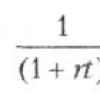How to ask a general question to a proposal. General questions in English
To communicate with foreigners, sometimes simple gestures are enough, but there are situations when it is extremely necessary to clarify something. This is where the difficulties begin, since few people remember how to set the general rules. The rules are often long forgotten, and the person is simply lost.
It makes no sense to argue with the fact that asking the right question is one of the most effective and fastest ways to obtain the required information from your interlocutor. By asking a question you can find out:
- name of the interlocutor;
- how to get to the place you need;
- information about the product you are interested in in the store;
- your health status if you end up in a hospital abroad;
- what to do in an emergency or emergency and etc.
However, people who have difficulties with the English language feel quite insecure in situations where they need to say something. As a rule, they are embarrassed to say anything at all, even if they need help or some clarification. Therefore, the ability to competently construct a question in English will give confidence to any person in any situation abroad.
What types of questions exist in English
Constructing affirmative sentences, as a rule, does not cause any particular difficulties for language learners, but composing questions is difficult. Only understanding their structure will make it clear to yourself how to ask a general question in English language. have their own characteristics and are used in everyday communication by native speakers. There are five question types in total, including:
- General question. For example: Do you like reading (Do you like read)?
- For example: Who bought this ugly hat(Who bought this terrible hat)?
- For example: Do you like comedies or dramas(Do you like comedies or dramas?)?
- A question asked to the subject. For example: Which pen is yours(Which pen is yours)?
- Separated question. For example: Children usually eat fruits and vegetables, don’t they(Children usually eat fruits and vegetables, don't they)?

Let's take a closer look at how to ask a general question in English.
Purpose of the question
This is the simplest and most common type of the five existing ones. It is asked of the entire sentence and requires a simple yes or no answer. Let's look at examples:
- I like eating chocolate. Do you like eating chocolate? Yes, I do. No, I don't. - I like to eat chocolate. Do you like to eat chocolate? Yes. No.
- Mark drives to California every month. Does Mark drive to California every month? Yes, he does. No, he doesn't. - Mark goes to California every month. Mark goes to California every month? Yes. No.
- They can bring Kate some fruit. Can they bring Kate some fruit? Yes, they can. No, they can't. - They can bring Katya fruit. Can they bring Katya some fruit? Yes. No.
Note that in order to construct a general question, the auxiliary word “do” is sometimes used. This verb and its derivatives are used in combination with other verbs to produce an interrogative or negative type of interrogative sentence. However, if it contains the verb "to be", the use of the auxiliary word "do" is not required. Let's look at examples:
- He is a generous man. Is he a generous man? Isn't he a generous man? - He is a generous man. Is he a generous man? Is he a generous man?
- They are doctors. Are they doctors? Aren't they doctors? - They are doctors. Are they doctors? Are they doctors?
- They visit Margaret every Tuesday. Do they visit Margaret every Tuesday? Don"t they visit Margaret every Tuesday? - They visit Margaret every Tuesday. Do they visit Margaret every Tuesday? Do they visit Margaret every Tuesday?

Question construction
How to ask a general question in English? It's easier than it might seem. First of all, you need to find the verb in the sentence and determine what function it performs:
- linking verb ( to be and its derivative forms - am, are, is);
- modal verb ( must, need, can, should, have to);
- main verb (any verb, e.g. jump, go, watch, work etc.).
Then you should determine the time of the question. In order not to get confused with its definition, try turning this phrase into For example, the interrogative sentence “Does your aunt like to sing?”, Let’s turn it into the affirmative “Your aunt likes to sing.” Once you have found the verb and determined the tense, move on to constructing the question itself.
Word order
Another point worth highlighting for those who do not know how to ask a general question in English is word order. While in Russian we just change the intonation and get a question sentence, this does not work in English. To ask something, it is not enough to simply change your intonation to interrogative. In the English interrogative construction it is characteristic reverse order words
This means that it is especially important in this situation to use either an auxiliary or modal verb, or a linking verb “to be”, in the required form. Next comes the subject (most often expressed by a personal pronoun), the predicate and other members of the sentence. Let's look at examples:
- They like expensive cars(they love expensive cars). IN in this example“they” serves as the subject, and “like” is the predicate. Do they like expensive cars(do they like expensive cars)? Here “do” acts as an auxiliary word, “they” as a subject, and “like” as a predicate.
- We are friends (m s friends). In this example, “we” is the subject and “are” is the predicate, in the form of the verb “to be” for the pronoun “we”. Are we friends (m are you friends)? Here “are” acts as the predicate and “we” as the subject.
- He can sing well(he sings well). In this example, “he” is the subject and “can” is the modal verb. C an he sing well(does he sing well)? Here “can” acts as the predicate, which comes first, and “he” is still the subject.

Constructing a negative form of a question
Having figured out the word order, you can move on to the next important point - how to ask a general question in English in the negative form. The mentioned construction in Russian, as a rule, begins with the words “really” or “unless” and serves to express surprise and misunderstanding. The formation scheme of this form is the same as that of the affirmative one, only with the use of the negative particle “not”. Let's look at examples:
1. Do you not like our French lessons? - Don’t you like our French lessons? - Don't you love our French lessons?
2.Are they not at work? - Aren’t they at work? - Are they not at work?
3. Must we not do this work tomorrow? - Mustn’t we do this work tomorrow?- Shouldn't we do this work tomorrow?

How to answer a question
A general question requires an unambiguous "yes" or "no", which is formed as follows:
1. A positive answer implies the use of the word “yes”, a pronoun and a verb. For example:
- Do you like eating strawberry cakes? Yes, I do. - Do you like to eat strawberry shortcakes? Yes.
- Should they go to the party this Friday?Yes, they should. - Should they go to the party this Friday? Yes.
- Is he a student of Harvard University?Yes, he is.- He is a student Yes.
2. A negative answer is formatted as follows: “no” + pronoun + verb + particle “not”. For example:
- Do they like watching TV before going to bed?No, they don't (don't).- Do they like to watch TV before going to bed? No.
- Can you read this new novel?No, I can't (can't).-Can you read this new novel? No.
- Is Casandra his friend's sister?No, she is not (isn"t).- Casandra is his friend's sister? No.

Intonation features
The hardest part is left behind, because you already have an idea of how to ask a general question in English. The rules of pronunciation and intonation are another point worth dwelling on. It is typical for the English language to pronounce common questions with a rising tone. This tone is used in all questions that can be answered with a clear “yes” or “no.” To make things clearer, let's look at some examples in more detail:
- "Do you "like this "new ↗films(do you like these new movies)? This is an interrogative sentence that implies a clear answer (yes/no), so it is pronounced in a rising tone.
- "Is it a↗ desk (uh then the desk)? This interrogative sentence can be answered unambiguously (yes/no), so it is pronounced in a rising tone.
- Have you got a↗ sister do you have a sister)? It is also pronounced in a rising tone, since it requires an affirmative “yes” or “no.”
Now you know how to ask a general question in English. The pronunciation rules in this case are very easy to remember.
Conclusion
So we've covered everything theoretical aspects regarding how to ask a general question - in English, this phrase is the simplest and at the same time the most important and common, therefore, knowing how to formulate it correctly, you can feel more confident in talking with foreigners abroad. To consolidate the material studied, you should move on to the practical part.

Consolidation exercises
1. To complete the first task, remember everything you have learned previously regarding how to ask a general question. In English, words after the ↗ sign are pronounced with a rising intonation:
- Is she↗ old?
- Do you↗ like it?
- Is it a↗ sofa?
- Can you↗ forger it?
- Must you↗ read it?
- Is it↗ your pen?
- Are you↗ brothers?
- Does she↗ love you?
- Is it↗ dirty?
- Are you↗ seventeen?
- Do they usually↗ watch TV?
- Can you repeat↗ after me?
- Is your brother a↗ policeman?
- Is Mary↗ kind?
- Do you like cooking?
2. Answer the following general questions:
- Are you a teacher?
- Should we go there?
- Can you help me on Monday?
- Are they right?
- Do they like it?
- Is she her cousin?
- Can you swim?
- Is his name Mark?
- Must I close the door?
- Does she know him?
- Can he jump?
- Is it cheap?
- Does he like fishing?
- Am I naughty?
- Can you forget about it?
3. Translate the following general questions into English:
- Do you want to go to the cinema with me tomorrow?
- Is she at home now?
- Is their car red?
- Can you turn off the TV?
- Are these children really that naughty?
- They are kind?
- Does she like tulips?
- Should I call him?
- Should she go there?
- Do you work on Saturday?
- Do you like to listen music?
- This is their home?
- Have you forgotten about our meeting?
- Can you repeat the last sentence?
- Do you know their parents?
- Do you work here?
- Do they see us?
- Can you call her back tomorrow morning?
- Don't you know where this building is?
- Is this the same person?
Mysterious Lady Grammar
Dear friends! Today you have an important date... You are going to meet a very arrogant lady. Her name is - She has few true and loyal friends. But even to those who managed to make friends with her, she does not forgive mistakes and careless treatment.
Well, in order to look decent in the eyes of this important lady, you and I need to prepare.
You need to learn to answer all her questions clearly and clearly. (are common, alternative, special and dividing), be able to maintain a conversation on the proposed topic. Well, if you start corresponding with her, consider it a good sign - Lady Grammar has introduced you to the circle of her admirers.
I'll tell you a secret: Lady Grammar has three cousins. Mr Do, Mr Does and Mr Did (they will help us learn how to construct questions general type) . How secretive people are, I tell you! Cousins Mr Do and Mr Does Moreover, they are also siblings. They somehow suddenly appear out of nowhere and disappear on their own in English, without saying a word to anyone.
For example, when Lady Gammar invites everyone to a cup of tea, you can hear:
Would do you like a cup of tea, sir?
The brothers, Mr Do and Mr Does, immediately pick up:
Do do you like Twinings Earl Gray tea? - asks Mr Do at his brother's. And he answers him: Yes, I do or No, I don't.
Then the conversation acquires a certain mystery (after all, we are now talking about the hostess - Lady Grammar). AND Mr Does asks in a whisper :Does she like Twinings Ear lGrey tea?
To which the older brother replies: Yes, she does. She always has it for 5 o"clock tea.
After tea, small talk turns to the golf course. And then you will hear the following questions:
Do do you like playing golf? Yes, I do. I usually play golf with my old friends.
Cousin Mr Did joins the conversation: Did you play golf yesterday?- No, I didn't. I was on my business trip in London.
Does your brother play golf well? No, he doesn't. But he plays the violin well. He is really good at it.

Little Hooligan Be
That's it! Did you notice too? This fidget came running, and an equally mysterious nephew - a boy named Be.
But we just need him to keep the conversation going:
Are are you keen on playing chess? Are are you fond of reading detectives? Are are you interested in history?
To which a very versatile boy will answer you: Yes, I am.
Of course, talking with a young attractive person is much more pleasant than with boring Mr Do And Mr Does. And you persistently continue to be interested in his personal life:
Are are you married? Are you a theater-goer? Are are you sure we can't go to the theater tonight?
But today he is unfortunately busy: Excuse me, but I am busy tonight. I am having my Spanish classes from 6 to 8 p.m. Let's go to the theater at weekends. I wil be free on Sunday.
Knowing his friend's fickleness, the slender and good-natured man intervenes in the conversation. Have, who came to Lady Grammar with his sister Has.
Have you ever been to Edinburgh? Have you got a kilt? Have you heard about Lady Grammar's garden parties yet?
Lady Grammar has joined a lot of people from around the world to reveal a secret:
HOW TO GET READY FOR YOUR EXAMS and PASS THEM WITH FLYING COLORS!
And Lady Grammar will tell you at her first tea party simple truths about
How to construct general questions in English
(General questions or Yes / No questions)
- General issues we ask when we want to find out what is happening, has happened or will happen
- We start general questions with an auxiliary verb ( do, does, did, am, are, is, was, were, have, has, had, will, would, can, could)
- We answer them briefly: Yes/No, which is why they are often called Yes/No questions
- intonation in general questions moves upward (as if a plane is taking off)
- You can only specify one general question to the offer
For example,
- Jane is keen on jazz music. - Is Jane keen on jazz music? Yes, she is/No, she isn't
- Jane often listens to jazz music. - Does Jane often listen(without ending -s, it ran to does) to jazz music?
- Jane listened to jazz music yesterday. — Did Jane listen(without the -ed ending, it was hidden in did) to jazz music yesterday? ( Past Simple)
- Jane has listened to jazz music today. —Has Jane listened to jazz music today? (Present Perfect)
- I'm sure, Jane will listen to jazz music tomorrow,too. — Will Jane listen to jazz music tomorrow? (Future Simple)
- Jane had listened to jazz music before her brother came home from gym. He hates jazz. — Had Jane listened to music before her brother came home from gym? (Past Perfect - one action occurs earlier than another in the past)
- Can I listen to jazz music with you, Jane? - Of course, you can. You can do it any time you like. (Modal verb)
To gain favor young man by name Be, whenever you meet him on your way, start a conversation with him:
Are you happy? Are are you hungry? Are are you cold? Are are you tired? Are are you afraid of spiders? Are are you proud of your friend? Is he still learning to play drums? Was he taking his music classes while we were having dinner?
But, alas, if it does not appear on the horizon, do not try to find a replacement for it. Nothing good will come of this.
I hope that your first acquaintance with Lady Grammar was successful and you understand how to construct general questions.
See you at the next tea party!
Watch a short video tutorial (only about three minutes!) on the rules for constructing general questions on my YouTube channel!
So, as the English proverb says—
There are several types of interrogative sentences in English. There are dividing, alternative, special, general questions. All types of questions have their own characteristics and rules for writing. General questions in English are usually learned to be asked first.
What is a common question?
General questions in English are formed on the basis of the affirmative form of a sentence. This question requires an affirmative or negative answer. By asking such a question, the interlocutor does not ask for any additional information. All that is required is confirmation or refutation of what is heard.
Have you made your notes yet? - Yes, I have (No, I have not). (Have you already taken your notes? - Yes. (No.))
How to ask a general question in English?
The first word in a general question is always the auxiliary verb. Each tense of the English language has its own auxiliary verb. One of their functions in a sentence is to participate in the composition of interrogative sentences. An auxiliary verb is followed by a subject (noun or pronoun) and a predicate (semantic verb). If the sentence is common, the basis of the sentence may be supported by other members of the sentence that are necessary in meaning.
Do they fix their car every two weeks? (Do they fix their car every two weeks?)
The only exception to this pattern is sentences with the verb to be as a predicate in Present (Past) Simple tenses. One of the features of the verb to be in these forms is the “rejection” of any auxiliary verbs. The verb to be itself acts as an auxiliary in such cases. In general questions, for example, he himself comes first before the subject, leaving his rightful place as the predicate. Compare:
Statement
The hats are too expensive to buy them now. - These hats are too expensive to buy now.
General question
Are the hats too expensive to buy them now. - Are these hats too expensive to buy now?
How to correctly answer a common question.
As already mentioned, a simple “yes” or “no” answer is often enough to answer a general question. Moreover, confirmation of information is often brief than its denial. And this is quite logical. After all, after the answer “no”, as a rule, correct, correct information is expected.
Are these toy soldiers made of metal? (Are these toy soldiers made of metal?)
Yes, they are. (Yes.)
No, they aren't. They are made of plastic. (No. They are made of plastic.)
In the process of studying the answers to common questions in English, it turns out that the “short answers” in English are not really that “short” after all. Of course, in fluent colloquial speech You can limit yourself, as in Russian, to the words “yes” (yes) or “no” (no). But as soon as the conversation takes on a slightly more formal character, this answer will have to be expanded a little.
A short affirmative English answer to a common question consists of:
- "Yes"
- comma after it,
- auxiliary verb (most often it is the same as in the question).
When translating this entire construction, it is enough to limit ourselves to one word “yes”.
Is it starting to snow outdoors? - Yes, it is. (Is it starting to snow outside? - Yes.)
A short negative English answer to a common question consists of:
- "No"
- comma after it,
- pronoun corresponding to the subject,
- auxiliary verb (most often it is the same as in the question),
- negative particle "not".
In a negative answer, both full and shortened negative forms of verbs can be used. The translation is also a simple “no”.
Did Robin live there? - No, he did not (No, he didn't.) (Robin lived there? - No.)
Features of a general question in Present Simple
It is worth paying special attention to how the general question is constructed in the Present Simple. The point here is in two variants of the auxiliary verb “do”. Depending on the form of the subject, when composing a general question you need to choose “do” or “does”. In order to understand where the form “does” came from, let’s return to the affirmative sentences of this time.
Lima’s parents keep old things in the garage. - Lima's parents store old things in the garage.
Lima keeps her word. - Lima keeps her word.
To a verb that is used as a predicate, (e)s is added in the third person singular. When composing a general question, this ending is transferred from the main verb to the auxiliary one. For comparison, here are two examples of how to write general questions in English in different faces time Present Simple.
Lima’s parents keep old things in the garage. - Do Lima’s parents keep old things in the garage?
Lima keeps her word. - Does Lima keep_ her word?
When does an answer need an auxiliary verb not from the question?
We now know that in short answers to a general question, just as in a general question, we need an auxiliary verb. In most cases it is the same as what was used in the question. But there are times when the meaning of the answer requires changing the subject, and therefore the auxiliary verb.
This usually happens when the question is asked in the second person (subject you (you)), and the meaning needs to be answered in the first person (I (I)); in tenses and forms using the verb to be as an auxiliary.
Are you leaving for New York tonight? - Yes, I am. (Are you leaving for New York today? - Yes.)
Were you deceived by your friends? - No, I wasn’t. (Did your friends deceive you? - No.)
A general question in English, examples of which we have looked at, is quite simple to formulate. But in order to do this accurately, you need to have a good knowledge of the system of tenses (and, therefore, auxiliary verbs) of the English language.
If, while studying English grammar, you finally got to the rather extensive topic “Types of Questions”, then first of all you have to master the “general question”. The general question, or General Question, is fundamental to all other types. Let me remind you that in English grammar it is customary to distinguish between 5 types of questions, and find general information You can read about them in the article: Types of questions in English. And now, we will take a closer look at the General Question. What are general questions for?
What's happened General issues and what are they for?
General Questions are questions that require the interlocutor to confirm or deny the words expressed in the question. General questions are asked to the entire sentence, and therefore require an affirmative or negative answer (“yes” or “no”). Because of this feature, they were given a second name - yes / no questions.
As a rule, general questions do not contain question words. Intonation in such questions rises towards the end of the sentence. General questions are characterized by the presence of partial inversion, i.e., a change in the order of words in a sentence, when the subject is followed by a predicate (part of the predicate, namely auxiliary or modal verbs, is placed in front of the subject).
Education Rules General Questions
1. If the predicate in a sentence is the verb to be (am, is, are, was, were) or to have (have, has, had) in the form Present Simple or Past Simple, then this verb is placed in first place before the subject and acts as an auxiliary. Examples:
- He is a barmen. — Is he a barmen? (He's a bartender. - He's a bartender?)
- I have a lot of time. — Have I much time? (I have a lot of time. - Do I have a lot of time?)
2. If the predicate in a sentence is expressed using the phrase there is (was), then the verb to be is placed before the word there, and after it the subject. For example:
- There was a big fight the night before. — Was there a big fight the night before? (There was a big fight last night. - There was a big fight last night?)
3. If the predicate includes an auxiliary (shall, will, should, would, etc.) or a modal (can, must, may, ought, should) verb, then it is placed in first place and acts as an auxiliary. Examples:
- I can give you something to read. — Can I give you anything to read? (I can give you something to read. - Can I give you something to read?)
- We will go there. -Will we go there? (We will go there. - We will go there?)
4. If the predicate includes two or more auxiliary verbs, then the first auxiliary verb is placed in front of the subject. For example:
- We have been living here for 6 years. — Have we been living here for 6 years? (We have been living here for 6 years. - We have been living here for 6 years?)
5. If the predicate does not contain auxiliary or modal verbs, i.e. the predicate is expressed by a verb in the Present Simple or Past Simple (with the exception of to be, to have), then to pose a question the auxiliary verb do (does) is used - for Present Simple and did are for Past Simple. The semantic verb in this case will appear in the infinitive form after the subject (without to).
We emphasize that the verb do in this case does not carry any semantic load and is not translated into Russian in any way. But at the same time, the entire grammatical load (number, person, tense) is transferred to it: in the Present Simple the ending -s, -es of the semantic verb in the 3rd person singular. numbers are taken over by the auxiliary verb do, turning into does; in the Past Simple, the ending -ed also takes over the verb do, turning into did. Examples:
- He goes to school. — Does he go to school? (He goes to school. - Does he go to school?)
- They live in London. — Do they live in London? (They live in London. - They live in London?)
- She bought a new dress. — Did she buy a new dress? (She bought a new dress. - Did she buy a new dress?)
6. If in a sentence the verb to have is part of a phrasal predicate (to have a rest, to have breakfast, etc.) or is used in a modal meaning (have to), then the auxiliary verb to do will be used to form a general question in the required form. Examples:
- We have a walk together. — Do we have a walk together? (We're walking together. - We're walking together?)
- We have to be there. - Do we have to be there? (We should be there. - Should we be there?)
Please note that in American English, general questions with the verb to haveе are always formed using the auxiliary verb to do. Compare:
- Am. E.: Do you have any workbooks?
- Br. E.: Have you any workbooks?
To summarize, the overall question outline looks like this:
Auxiliary verb → Subject → Predicate → Secondary elements of a sentence?
Sometimes in colloquial speech (in familiar address) general questions can be used without inversion. That is, the word order in them remains the same as in declarative sentences, and they differ only in intonation. Examples:
- Do you really want it? − Yes, I do. (Do you really want this? - Yes.)
- Do you like this work? − Very much. (Do you like this job? - Very much.)
Answers to common questions
Answers to general questions should confirm or deny what the question asked. They can be short or extensive, they can express shades of doubt or confidence, and they can also contain additional words.
1. The answer may consist of a word-sentence or phrase-sentence. Examples:
- Did he ring you up yesterday? −Yes. (Did he call you yesterday? - Yes.)
- Are you reading? − No. (Are you reading? - No.)
- Will you help me? - Why, sure! (Will you help me? - Of course!)
- Do you remember that day? − Yes, of course. (Do you remember that day? - Yes, of course.)
- Have you any observations to his behavior? −Oh, no! (Do you have any comments about his behavior? - Oh, no!)
2. The answer may consist of an affirmative or negative word or phrase and (after a comma) a short sentence consisting of a personal pronoun in Im. case and the auxiliary or modal verb used in the question. In a negative answer, the negative particle not is added to the verb. Examples:
- Will you attend our dance classes? − Of course, I will. (Will you attend our dance classes? − Of course I will.)
- Did you phone Jim yesterday? − Yes, I did. (Did you call Jim yesterday? - Yes.)
- Does your sister know Spanish? − No, she doesn’t. (Does your sister know Spanish? - No.)
- Did you enjoy the presentation? − No, I didn’t. (Did you like the presentation? - No.)
- Is he free now? − No, he isn’t. (Is he free now? - No.)
- Can you play tennis? − Yes, I can. (Do you know how to play tennis? - Yes.)
Answers can be without words of confirmation or denial.
- Did you read the letter I gave you? − I didn’t. (Did you read the letter I gave you? - No.)
- Was she at the party on Monday? - She was. (Was she at the party on Monday? - Yes.)
Please note that in Russian short answers may repeat the predicate that was in the general question. For example:
- Did you write her a letter? - Yes, I wrote it.
- Are you buying these earrings? - Yes, I’m buying it.
In English, the semantic verb is never repeated in a short answer. For example:
- Have you bought this book? − No, I haven’t. (Did you buy this book? - No.)
- Did you feed your dog? − Yes, I did. (Have you fed your dog? - Yes.)
3. The answer to a general question may consist of confirmation or denial with a tinge of regret or uncertainty. In this case, the answers consist of a subject and verbs: believe - to believe, think - to think, suppose - to assume, hope - to hope, to be afraid - to be afraid, with the adverb so or with the negation not (in the negative form). For example:
- I think so − I think so
- I don’t think so − I don’t think so
- I hope so - I hope
- I hope not - I hope not
- We'll have to wait here long? − I hope not. (Will we have to wait here for a long time? - I hope not.)
- Is it time to leave? − Yes, I think so. (Is it time to leave? - I think so.)
- Is it a good idea to go there on Friday? − I don’t think so. (Is it a good idea to go there on Friday? - I don’t think so.)
- Instead of so and not, short phrases of confirmation or negation are sometimes used. For example:
- Do you remember where Nick lives? − I’m afraid I don’t. (Do you remember where Nick lives? - I'm afraid not.)
Negative form of general questions
The negative form of general questions in English expresses surprise. In Russian, it corresponds to questions that begin with the words “is it possible”, “is it really possible”.
To form a negative form, the negation not is used, which is placed before the semantic verb. But the full form not is very rare; it usually merges with an auxiliary or modal verb into one whole (n"t). Examples:
- Does she not speak Spanish? = Doesn’t she speak Spanish? (Doesn't she speak Spanish?)
- Must I not go there? = Mustn’t I go there? (Shouldn't I go there?)
When answering a similar question in Russian, we can use two options containing either denial or confirmation. For example: “yes, I should”, “no, I should”. In English, everything is much stricter: in an affirmative answer there is always Yes, in a negative answer there is always No.
Before looking at examples, let's first remember the definition of general questions.
General questions are asked to the interlocutor in order to obtain confirmation or denial of the entire thought expressed in the question and, thus, require a yes or no answer. They begin with an auxiliary or modal verb.
1. Examples of general questions with the verb to be.
- Am I right? - I'm right?
- Is he in London? - He is in London?
- Is it your bag? - Is this your bag?
- Are you at the hotel? -Are you at the hotel?
- Are grapes grown in California? – Do they grow grapes in California?
- Was Mary there? – Was Maria there?
- Was the story interesting? – Was the story interesting?
- Were they tired? – Were they tired?
- Were the walls painted? – Were the walls painted?
2. Examples of general questions, sorted by time.
- Present Continuous
Is your husband sleeping? – Is your husband sleeping?
Are you talking to him now? -Are you talking to him now? - Past Continuous
Were you sleeping at 10 o’clock yesterday evening? – Were you asleep at 10 pm yesterday?
Was it raining at noon? – Was it raining at noon? - Future Continuous
Will you be working at 5 oclock? – Will you be working at 5 o’clock?
Will he be sitting in the first row? – Will he sit in the front row? - Present Simple
Do you love her? - Do you love her?
Does your father live in New York? – Does your dad live in New York? - Past Simple
Did John and Mary recognize him? – Did John and Mary recognize him?
Did you prepare the presentation? – Have you prepared a presentation? - Future Simple
Will they call us tomorrow? – Will they call us tomorrow?
Will Ann look after him? – Will Anna look after him? - Present Perfect
Have you seen the manager today? -Have you seen the manager today?
Has your daughter ever been to London? – Has your daughter ever been to London? - Past Perfect
Had the train arrived by that time? – Has the train arrived by then?
Had Molly already called him when you came? “Molly already called him when you arrived?” - Present Perfect Continuous
Has the dog been barking for more than an hour? – Has the dog been barking for more than an hour?
Have you been setting the table since 2 o"clock? - Have you been setting the table since two o'clock?
3. Examples of general questions with modal verbs.
- Modal verb can/could
Can you stay here? -Can you stay here?
Could you lendme a dictionary please? – Can you borrow a dictionary, please? - Modal verb May
May I come in? -Can I come in?
May I use the car tonight? – Can I rent a car this evening? - Modal verb Must
Must I go there? – Do I need to go there?
Must I help in the garden? – Should I help in the garden? - Modal verb Need
Need he come here? – Does he need to come here?
Need I go there at once? – Should I go there now?



















